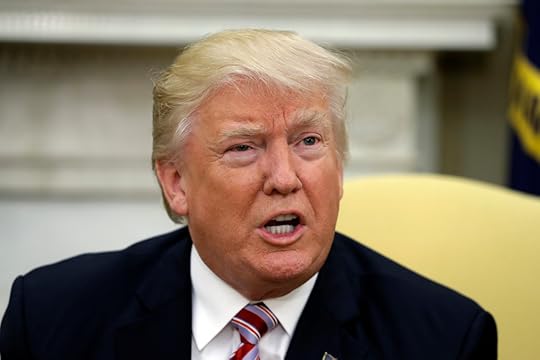Chris Hedges's Blog, page 374
January 1, 2019
Congressional Leaders Invited to White House for Border Briefing
WASHINGTON—President Donald Trump on Tuesday invited congressional leaders to a White House briefing on border security as the partial government shutdown dragged on over funding for a border wall, with Trump tweeting, “Let’s make a deal?”
The briefing will happen at 3 p.m. EST Wednesday, the day before the Democrats take control of the House, but the exact agenda wasn’t immediately clear, according to a person with knowledge of the briefing who was not authorized to speak publicly about the issue and spoke to The Associated Press on condition of anonymity.
The White House said the briefing would be provided by senior Department of Homeland Security officials.
Republican leaders will be attending. Senate Majority Leader Mitch McConnell, as well as the top incoming House Republicans, Kevin McCarthy of California and Steve Scalise of Louisiana, are planning to be at the briefing, according to aides. Retiring Speaker Paul Ryan will not.
Nancy Pelosi, who is expected to take over as House speaker, and top Senate Democrat Chuck Schumer will also be in attendance.
Pelosi said Democrats would take action to “end the Trump Shutdown” by passing legislation Thursday to reopen the government.
“We are giving the Republicans the opportunity to take yes for an answer,” Pelosi wrote In a letter to colleagues late Tuesday. “Senate Republicans have already supported this legislation, and if they reject it now, they will be fully complicit in chaos and destruction of the President’s third shutdown of his term.”
The White House invitation comes after House Democrats released their plan to re-open the government without approving money for a border wall — unveiling two bills to fund shuttered government agencies and put hundreds of thousands of federal workers back on the job. They planned to pass them as soon as the new Congress convenes Thursday.
Trump spent the weekend saying Democrats should return to Washington to negotiate, firing off Twitter taunts. He then revised his aides’ comments to state that he really still wants to build a border wall.
On Tuesday morning, after tweeting a New Year’s message to “EVERYONE INCLUDING THE HATERS AND THE FAKE NEWS MEDIA,” Trump tweeted: “The Democrats, much as I suspected, have allocated no money for a new Wall. So imaginative! The problem is, without a Wall there can be no real Border Security.”
But he seemed to shift tactics later in the day, appealing to Pelosi. “Border Security and the Wall ‘thing’ and Shutdown is not where Nancy Pelosi wanted to start her tenure as Speaker! Let’s make a deal?” he tweeted.
Whether the Republican-led Senate, under McConnell, would consider the Democratic bills — or if Trump would sign either into law — was unclear. McConnell spokesman Donald Stewart said Senate Republicans would not take action without Trump’s backing.
“It’s simple: The Senate is not going to send something to the president that he won’t sign,” Stewart said.
Even if only symbolic, the passage of the bills in the House would put fresh pressure on the president. At the same time, administration officials said Trump was in no rush for a resolution to the impasse.
Trump believes he has public opinion on his side and, at very least, his base of supporters behind him, the officials said, speaking on the condition of anonymity because they were not authorized to speak publicly.
White House officials, including the departing chief of staff, had indicated that Trump’s signature campaign pledge to build the wall would not be fulfilled as advertised. Chief of staff John Kelly told the Los Angeles Times in an interview published Sunday that Trump abandoned the notion of “a solid concrete wall early on in the administration.”
The Democratic package to end the shutdown would include one bill to temporarily fund the Department of Homeland Security at current levels — with $1.3 billion for border security, far less than the $5 billion Trump has said he wants for the wall — through Feb. 8 as talks continued.
It would also include another measure to fund the departments of Agriculture, Interior, Housing and Urban Development and others closed by the partial shutdown. It would provide money through the remainder of the fiscal year, to Sept. 30.
Democrats under Pelosi were all but certain to swiftly approve the package in two separate votes Thursday. They would take place after the election of a new House speaker, a contest Pelosi was expected to win as leader of the new House majority.
Responding to the Democratic plan, White House press secretary Sarah Huckabee Sanders late Tuesday night called it a “non-starter” and said it won’t re-open the government “because it fails to secure the border and puts the needs of other countries above the needs of our own citizens.”
Republican senators left for the holidays refusing to vote on any bills until all sides, including Trump, were in agreement. The lawmakers were frustrated that Trump had dismissed their earlier legislation.
The president has not said he would veto the Democratic legislation, if the bills were to land on his desk. But a prolonged crisis could hobble House Democrats’ ability to proceed with their agenda, which includes investigations of the president and oversight of his administration, including Russian interference in the 2016 election.
At least one Republican, South Carolina Sen. Lindsey Graham, encouraged Trump to use the budget impasse as an opportunity to address issues beyond the border wall. But a previous attempt to reach a compromise that addressed the status of “Dreamers” — young immigrants brought to the U.S. as children — broke down last year as a result of escalating White House demands. Graham said Trump was “open minded” about his proposal.
The partial government shutdown began Dec. 22 after Trump bowed to conservative demands that he fight to make good on his vow and secure funding for the wall before Republicans lose control of the House on Wednesday. Democrats have remained committed to blocking any funding for the wall.
With neither side engaging in substantive negotiation, the effect of the partial shutdown was set to spread and to extend into the new year.
___
Associated Press writer Kevin Freking contributed to this report.

U.S. Again Fires Tear Gas Across Mexico Border to Stop Migrants
TIJUANA, Mexico—U.S. authorities fired tear gas into Mexico during the first hours of the new year to repel about 150 migrants who tried to breach the border fence in Tijuana.
U.S. Customs and Border Protection said in a statement later Tuesday that the gas was used to target rock throwers apart from the migrants who were trying to cross.
“No agents witnessed any of the migrants at the fence line, including children, experiencing effects of the chemical agents, which were targeted at the rock throwers further away,” the statement said.
An Associated Press photographer saw at least three volleys of gas launched onto the Mexican side of the border near Tijuana’s beach that affected the migrants, including women and children, as well as journalists. The AP saw rocks thrown only after U.S. agents fired the tear gas.
The agency said agents saw “toddler-sized children” being passed over concertina wire with difficulty. It said its agents could not assist the children because of the rocks being thrown. Agents responded with smoke, pepper spray and tear gas, it said. The AP journalist also saw plastic pellets fired by U.S. agents.
The agency said 25 migrants were detained while others crawled back into Mexico through a hole under the fence.
Customs and Border Protection said that under its use of force policy the incident would be reviewed by its Office of Professional Responsibility.
Migrants who spoke with AP said they arrived in Tijuana last month with the caravan from Honduras.
The caravan, which left Honduras in mid-October, grew to more than 6,000 members during its month-and-a-half trek north. It has been a constant target of President Donald Trump, who referred to it frequently in the run-up to U.S. mid-term elections in November.
Many of the migrants are waiting in Tijuana for a chance to apply for asylum in the U.S., but there was a backlog before the caravan’s arrival and the wait is expected to be many months. Others have found jobs in Mexico and tried to settle there.
In a previous incident, U.S. agents launched tear gas across the border after some migrants tried to breach the border following a peaceful march in Tijuana on Nov. 26. Hundreds of migrants who were downwind of the gas were affected.
Trump is currently locked in a fight with congressional Democrats over funding for the border wall that he wants to build. The stalemate has led to a partial government shutdown.

Brazil’s Bolsonaro Assumes Presidency, Promises Big Changes
BRASILIA, Brazil—Jair Bolsonaro was sworn in as Brazil’s president Tuesday, taking the reins of Latin America’s largest and most populous nation with promises to overhaul myriad aspects of daily life and put an end to business-as-usual governing.
For the far-right former army captain, the New Year’s Day inauguration was the culmination of a journey from a marginalized and even ridiculed congressman to a leader who many Brazilians hope can combat endemic corruption as well as violence that routinely gives the nation the dubious distinction of being the world leader in total homicides.
A fan of U.S. President Donald Trump, the 63-year-old longtime congressman rose to power on an anti-corruption and pro-gun agenda that has energized conservatives and hard-right supporters after four consecutive presidential election wins by the left-leaning Workers’ Party.
Bolsonaro was the latest of several far-right leaders around the globe who have come to power by riding waves of anger at the establishment and promising to ditch the status quo.
“Congratulations to President @jairbolsonaro who just made a great inauguration speech,” Trump tweeted. “The U.S.A. is with you!”
Tuesday’s festivities in the capital of Brasilia began with a motorcade procession along the main road leading to Congress and other government buildings. Bolsonaro and his wife, Michelle, stood up in an open-top Rolls-Royce and waved to thousands of onlookers.
They were surrounded by dozens of guards on horses and plain-clothes bodyguards who ran beside the car.
Once inside Congress, Bolsonaro and his vice president, retired Gen. Hamilton Mourao, took the oath of office. Bolsonaro then read a short speech that included many of the far-right positions he staked out during the campaign.
He promised to combat the “ideology of gender” teaching in schools, “respect our Judeo-Christian tradition” and “prepare children for the job market, not political militancy.”
“I call on all congressmen to help me rescue Brazil from corruption, criminality and ideological submission,” he said.
A short time later, Bolsonaro spoke to thousands of supporters outside, promising to “free Brazil” from socialism and political correctness.
As he spoke, supporters began to chant “Myth! Myth! Myth!”— a nickname that began years ago with internet memes of Bolsonaro and became more common during last year’s campaign. Bolsonaro’s middle name is Messias, or Messiah in English, and many supporters believe he was chosen by God to lead Brazil, an assertion bolstered after Bolsonaro survived a stabbing during a campaign rally in September.
During Tuesday’s speech, Bolsonaro stopped at one point, pulled out a Brazilian flag and wildly waved it, prompting roars from the crowd.
“Our flag will never be red,” Bolsonaro said, a reference to communism. “Our flag will only be red if blood is needed to keep it green and yellow.”
Brasilia was under tight security, with 3,000 police patrolling the event. Military tanks, fighter jets and even anti-aircraft missiles also were deployed. Journalists were made to arrive at locations seven hours before festivities began, and many complained on Twitter of officials confiscating food they had brought for the wait.
The increased security came at Bolsonaro’s request. His intestine was pierced when a knife-wielding man stabbed and nearly killed him, and today Bolsonaro wears a colostomy bag. His sons, politicians themselves, had insisted their father could be targeted by radicals, but security officials have not spoken of threats.
Bolsonaro did little moderating since being elected in October, with progressives and liberals decrying stances that they say are homophobic, sexist and racist.
The new president, who spent nearly three decades in Congress, has also drawn international criticism for his plans to roll back regulations in the Amazon and his disinterest in social programs in a country that is one of the world’s most unequal in terms of income.
On the economic front, where Bolsonaro will ultimately lead Latin America’s largest economy is unknown, as during the campaign he reversed course from previous statist stances with pledges to lead market-friendly reforms. He also promised to overhaul Brazil’s pension system and privatize several state-owned companies, which gave him wide support among financial players.
On Tuesday, Bolsonaro reiterated his commitment to fighting crime in a nation that has long led the world in annual homicides. More than 63,000 people were killed last year.
He wants to tackle the problems in part by shielding police who kill during an operation from criminal prosecution.
“We are counting on Congress to provide the judicial support so police can do their jobs,” Bolsonaro said, signaling that he may soon submit legislation that would allow police to be tried outside the criminal system.
Human rights groups fear that defense of police violence could shield officers from investigations of misconduct and lead to more extrajudicial killings.
The most notable foreign leaders who attended were associated with far-right movements: Israeli Prime Minister Benjamin Netanyahu and Hungarian Prime Minister Viktor Orban.
Leftist Presidents Nicolas Maduro of Venezuela, Daniel Ortega of Nicaragua and Miguel Díaz-Canel of Cuba, deemed dictators by Bolsonaro, were uninvited by Bolsonaro’s team after the foreign ministry sent them invitations. Leftist President Evo Morales of Bolivia, however, was invited and warmly embraced Bolsonaro after the ceremony. The United States was represented by Secretary of State Mike Pompeo.
Seven of Bolsonaro’s 22 Cabinet ministers are former military personnel, more than in any administration during Brazil’s 1964-1985 dictatorship. That has sparked fears among his adversaries of a return to autocratic rule, but Bolsonaro insists he will respect the country’s constitution.
Riordan Roett, a professor and director emeritus of Latin American Studies at Johns Hopkins University, noted that generals have administration skills that can be useful in government.
“The danger is that as a former low-ranking military officer, (Bolsonaro) will be swayed by some of the generals to come down hard on criminality, drug dealers, etc., and that may cause a backlash and many innocent people could be caught in the crossfire,” Roett said.
Bolsonaro’s Liberal and Social Party will have 52 seats in Brazil’s 513-member lower house, the second largest bloc behind the Workers’ Party.
Gary Hufbauer of the Peterson Institute for International Economics, a Washington-based think tank, said a central challenge for Bolsonaro will be curbing spending and entitlements, no easy task given the makeup of Congress and entrenched interests.
“Bolsonaro needs some quick successes to get off on the right foot with the public and the political elites,” said Hufbauer, adding that a failure to do that would likely reduce Bolsonaro’s honeymoon period to six months.
___
Associated Press video journalist Yesica Fisch reported this story in Brasilia, AP writer Mauricio Savarese reported from Sao Paulo and AP writer Peter Prengaman reported from Rio de Janeiro. AP writer Stan Lehman in Sao Paulo contributed to this report.

NASA Spacecraft Opens New Year With Most Distant Flyby Ever
LAUREL, Md.—NASA’s New Horizons spacecraft pulled off the most distant exploration of another world Tuesday, skimming past a tiny, icy object 4 billion miles from Earth that looks to be shaped like a bowling pin.
Flight controllers in Maryland declared success 10 hours after the high-risk, middle-of-the-night encounter at the mysterious body known as Ultima Thule on the frozen fringes of our solar system, an astounding 1 billion miles (1.6 billion kilometers) beyond Pluto.
“I don’t know about all of you, but I’m really liking this 2019 thing so far,” lead scientist Alan Stern of Southwest Research Institute said to applause. “I’m here to tell you that last night, overnight, the United States spacecraft New Horizons conducted the farthest exploration in the history of humankind, and did so spectacularly.”
The close approach came a half-hour into the new year, and 3 ½ years after New Horizons’ unprecedented swing past Pluto.
For Ultima Thule — which wasn’t even known when New Horizons departed Earth in 2006 — the endeavor was more difficult. The spacecraft zoomed within 2,200 miles (3,500 kilometers) of it, more than three times closer than the Pluto flyby.
Operating on autopilot, New Horizons was out of radio contact with controllers at Johns Hopkins University’s Applied Physics Laboratory from late Monday afternoon until late Tuesday morning. Scientists wanted the spacecraft staring down Ultima Thule and collecting data, not turning toward Earth to phone home.
Mission operations manager Alice Bowman said she was more nervous this time than she was with Pluto in 2015 because of the challenges and distance, so vast that messages take more than six hours, one way, to cross the 4 billion miles (6.4 billion kilometers). When a solid radio link finally was acquired and team members reported that their spacecraft systems were green, or good, she declared with relief: “We have a healthy spacecraft.” Later, she added to more applause: “We did it again.”
Cheers erupted in the control center and in a nearby auditorium, where hundreds more — still weary from the double countdowns on New Year’s Eve — gathered to await word. Scientists and other team members embraced and shared high-fives, while the spillover auditorium crowd gave a standing ovation.
Stern, Bowman and other key players soon joined their friends in the auditorium, where the celebration continued and a news conference took place. The speakers took delight in showing off the latest picture of Ultima Thule , taken just hundreds of thousands of miles before the 12:33 a.m. close approach.
“Ultima Thule is finally revealing its secrets to us,” said project scientist Hal Weaver of Johns Hopkins.
Based on the early, rudimentary images, Ultima Thule is highly elongated — about 22 miles by 9 miles (35 kilometers by 15 kilometers). It’s also spinning, although scientists don’t yet know how fast.
As for its shape, scientists say there are two possibilities.
Ultima Thule is either one object with two connected lobes, sort of like a spinning bowling pin or peanut still in the shell, or two objects orbiting surprisingly close to one another. A single body is more likely, they noted. An answer should be forthcoming Wednesday, once better, closer pictures arrive.
By week’s end, “Ultima Thule is going to be a completely different world, compared to what we’re seeing now,” Weaver noted.
Still, the best color close-ups won’t be available until February. Those images should reveal whether Ultima Thule has any rings or moons, or craters on its dark, reddish surface. Altogether, it will take nearly two years for all of New Horizons’ data to reach Earth.
The observations should help scientists ascertain how deep-freeze objects like Ultima Thule formed, along with the rest of the solar system, 4.5 billion years ago.
As a preserved relic from that original time, Ultima Thule also promises to shed light on the so-called Kuiper Belt, or Twilight Zone, in which hundreds of thousands of objects reside well beyond Neptune.
“This mission’s always been about delayed gratification,” Stern reminded reporters. He noted it took 12 years to sell the project, five years to build it and nine years to reach the first target, Pluto.
Its mission now totaling $800 million, the baby grand piano-sized New Horizons will keep hurtling toward the edge of the solar system, observing Kuiper Belt Objects, or KBOs, from afar, and taking cosmic particle measurements. Although NASA’s Voyagers crossed the Kuiper Belt on their way to true interstellar space, their 1970s-era instruments were not nearly as sophisticated as those on New Horizons, Weaver noted, and the twin spacecraft did not pass near any objects known at the time.
The New Horizons team is already pushing for another flyby in the 2020s, while the nuclear power and other spacecraft systems are still good.
Bowman takes comfort and pleasure in knowing that long after New Horizons stops working, it “will keep going on and on.”
“There’s a bit of all of us on that spacecraft,” she said, “and it will continue after we’re long gone here on Earth.”
___
The Associated Press Health & Science Department receives support from the Howard Hughes Medical Institute’s Department of Science Education. The AP is solely responsible for all content.

Netflix Removed Clip That Criticized Saudi Arabia’s Human Rights Record
Netflix removed an episode of the comedy show “Patriot Act with Hasan Minhaj” that criticized Saudi Arabia’s human rights record after a request from the Saudi government to do so, according to a report by the Financial Times.
In the November clip, Minhaj explained why the killing of Washington Post columnist Jamal Khashoggi at the Saudi consulate in Istanbul, Turkey, is only one instance in a long list of violations. He took issue with the detainment of women’s rights activists and Saudi Arabia’s direct role in the humanitarian crisis in Yemen.
Minhaj addressed the reputation of Saudi Crown Prince Mohammed bin Salman directly: “It blows my mind that it took the killing of a Washington Post journalist for everyone to go, ‘Oh, I guess he’s really not a reformer.’ Meanwhile, every Muslim person you know was like, ‘Yeah, no shit. He’s the crown prince of Saudi Arabia.’ Now would be a good time to reassess our relationship with Saudi Arabia. And I mean that as a Muslim and as an American,” he said.
At the end of the episode, Minhaj turned to Silicon Valley’s close financial relationship with Saudi Arabia. “WeWork won’t let you expense meat,” he said, referencing the startup’s July decision to ban meat over environmental concerns, “but you take money from Saudi Arabia? So you’re against slaughterhouses unless they’re in Yemen?”
The Kingdom’s Communications and Information Technology Commission asked that the clip be removed because of a law allowing a ban on digital media “impinging on public order, religious values, public morals, and privacy.”
Scoop: Netflix pulls episode of @hasanminhaj’s comedy show after Saudi complaint https://t.co/DQOpY2VD0p
— Ahmed Al Omran (@ahmed) January 1, 2019
On the second episode of Hasan Minhaj’s new show, he highlights the role Saudi money plays in propping up Silicon Valley companies. Now Netflix has removed the episode at the request of the Saudi government. Bad call @netflix. https://t.co/TTpDFTdNT3
—
Let’s Make Ending Militarism Our New Year’s Resolution
This piece originally appeared on anti-war.com.
Most New Year’s resolutions last but a few days. By late January, the crowd in the gym dwindles down to its normal size. Most resolutions are fantasy, a simple act of wishful thinking. We all know this. Still, dreams are what makes life tolerable. So, in that spirit, let’s take a break from the standard critique of existing U.S. foreign policy and conjure a world as it should be, not as it is. Consider this the ultimate New Year’s make believe – a resolution to swear off militarism and forever war in the Greater Middle East.
It would begin with a restructuring of the entire legal framework for American war-making. US soldiers still kill and die – and bomb at least seven countries – under two outdated Authorizations for the Use of Military Force (AUMF). One, in 2001, authorized the president to battle the culprits of the 9/11 attacks, the Al Qaeda organization. The other, in 2003, approved the tragic-comic invasion of Iraq to remove Saddam Hussein. Neither resolution is relevant to the fights at hand, which, therefore are only of dubious legality. In 2019, the US Congress should reassert its constitutional primacy in warfare, overturn the old AUMFs, and demonstrate the courage to debate and vote on each of America’s ongoing wars. If the people’s representatives truly believe any of the ongoing shooting wars – in Syria, Libya, Niger, Iraq, Yemen, Pakistan, and Afghanistan – are worth fighting, then let them say so publicly and declare war.
My guess is that most congressmen, knowing the prevailing public skepticism of ongoing overseas interventions, wouldn’t authorize the continuation of these disastrous campaigns. America’s forever warfare state might wither under the light of legitimate oversight. Nevertheless, no matter how Congress voted, the very act of public debate and accountability would be a refreshing change for our ostensible republic. When it comes to the momentous decisions of war and peace, more, not less, transparency should be the norm in 2019.
Next, in our dream scenario, the US House would pass the recent Senate bill and pull all American military support from the disastrous Saudi-led terror war in Yemen. Then, in a surprise reversal of his stated intent, President Trump wouldn’t veto but rather sign this better-late-than-never legislation. The withdrawal of all US intelligence, logistics, and munitions support might then slow the pace of the world’s worst humanitarian catastrophe – which has led to the starvation deaths of at least 85,000 Yemeni children.
While we’re at it, the president and Congress would take matters even further, to wit, freezing all military aid and arms sales to Saudi Arabia until it ends its war in Yemen, fesses up to the murder of Jamal Khassogi, and removes Mohammed bin Salman (MBS) as crown prince. In doing so, the US would make clear that there are humanitarian red lines it will no longer cross and admit that Saudi Arabia’s repressive theocracy is little more than an “official” ISIS caliphate. Oh, and for that matter, Washington should make clear that American troops will not be drawn into an ill-advised, unnecessary war with Iran on behalf of the Saudis.
In Syria, Trump would ignore congressional hawks and the bipartisan interventionist fanatics in the media and swiftly extricate the troops from a dangerous, aimless war of questionable legality. He’d accept the region as it is, not as Washington wishes it were, and open talks with Putin and Assad. Whatever the newly minted Cold Warriors over at MSNBC claim, both these leaders can and should be dealt with. Assad has already won the civil war. The best deal the US can hope for is one that promises limited civil and cultural autonomy to the Kurds and a Russian-Syrian commitment to fight our shared enemy – the remnants of ISIS.
Next, the US would admit strategic failure in Iraq and withdraw the last of its troops from what’s been a 15-year saga of farcical defeat. There is no more to be done in Iraq and further commitment only risks the outbreak of yet another anti-American insurgency. It’s time to get out of the occupation game – neo-imperialism has only spelled disaster these many years. Look, the Iraqis, by and large, don’t want us there! In the wake of Trump’s recent visit, Iraqi politicians from both sides of a divided parliament called for a prompt American withdrawal. Let’s give them what they want before it’s too late.
The unwinnable war in Afghanistan – America’s longest ever – must end in 2019. The U.S.-backed government in Kabul is facing imminent military defeat whether Washington likes it or not. What follows won’t be pretty, to be sure, but continued American intervention only plays for a tie, delays the inevitable, and costs ever more blood and treasure. It’s time to cut losses, ignore sunken costs, and quit throwing good money at bad. Trump’s reported intent to pull out half the troops in Afghanistan is a good start and should be followed by full, prudent withdrawal before year’s end. After nearly eighteen years of fruitless war, now that’d be a New Year’s Resolution for the ages.
Finally, in the spirit of getting tough on our complex regional frenemies, Washington would reverse course on Israel, apply pressure, and win back what’s left of America’s good name on the Arab “street.” As with Saudi Arabia, so with Israel. Until (soon-to-be-indicted) Prime Minister Netanyahu freezes all illegal Jewish settlement building in the West Bank, grants civil rights and a path to meaningful sovereignty to Palestinians, and lifts the stranglehold on Gaza, the US should halt all military aid and arms sales. Such a policy has the benefit of being both strategically and ethically sound, and that’s a rare thing in this world. Firstly, Palestinians are human beings, and, furthermore, its long past time for an American president to make clear that this country refuses to fight Israel’s wars – including with Iran – any longer. After all, didn’t Trump say something about “America First” on the campaign trail?
In 2019, Trump, who is unfortunately already wavering, should continue to defy the bipartisan orthodoxy of forever war and bring home the troops from Washington’s various Mideast quagmires. Just before the holidays, the president demonstrated some earthy common sense in calling for said troop withdrawals and even tweeted that US defense spending was “crazy.” (Though, under pressure from the “adults” in his administration, he promptly reversed himself.). Nonetheless, Trump showed some good judgment in December 2018 that makes our dream resolution scenario seem just a little less far-fetched. And, as a rule, when the president pisses off both mainstream Dems and Repubs he just might be on to something!
Should he continue to do so, should he truly take on the military-congressional-industrial complex and bring home the troops, then this author – who has spent the better part of two years criticizing this president’s policies – might just begin chanting “Drain the swamp!” right along with him.
Trump pulling a foreign policy one-eighty in 2019, now that’d be one hell of a New Year’s Resolution. Let’s hope that fantasy lasts past January…
Danny Sjursen is a US Army officer and regular contributor to Antiwar.com He served combat tours with reconnaissance units in Iraq and Afghanistan and later taught history at his alma mater, West Point. He is the author of a memoir and critical analysis of the Iraq War, Ghostriders of Baghdad: Soldiers, Civilians, and the Myth of the Surge. Follow him on Twitter at @SkepticalVet.
[Note: The views expressed in this article are those of the author, expressed in an unofficial capacity, and do not reflect the official policy or position of the Department of the Army, Department of Defense, or the U.S. government.]
Copyright 2018 Danny Sjursen

U.S. and Israel Exit U.N. Cultural Agency at Stroke of Midnight
PARIS — The United States and Israel officially quit the U.N.’s educational, scientific and cultural agency at the stroke of midnight, the culmination of a process triggered more than a year ago amid concerns that the organization fosters anti-Israel bias.
The withdrawal is mainly procedural yet serves a new blow to UNESCO, co-founded by the U.S. after World War II to foster peace.
The Trump administration filed its notice to withdraw in October 2017 and Israeli Prime Minister Benjamin Netanyahu followed suit.
The Paris-based organization has been denounced by its critics as a crucible for anti-Israel bias: blasted for criticizing Israel’s occupation of East Jerusalem, naming ancient Jewish sites as Palestinian heritage sites and granting full membership to Palestine in 2011.
The U.S. has demanded “fundamental reform” in the agency that is best known for its World Heritage program to protect cultural sites and traditions. UNESCO also works to improve education for girls, promote understanding of the Holocaust’s horrors, and to defend media freedom.
The withdrawals will not greatly impact UNESCO financially, since it has been dealing with a funding slash ever since 2011 when both Israel and the U.S. stopped paying dues after Palestine was voted in as a member state. Since then officials estimate that the U.S. — which accounted for around 22 percent of the total budget — has accrued $600 million in unpaid dues, which was one of the reasons for President Donald Trump’s decision to withdraw. Israel owes an estimated $10 million.
UNESCO Director General Audrey Azoulay took up her post just after Trump announced the pullout. Azoulay, who has Jewish and Moroccan heritage, has presided over the launch of a Holocaust education website and the U.N.’s first educational guidelines on fighting anti-Semitism — initiatives that might be seen as responding to U.S. and Israeli concerns.
Officials say that many of the reasons the U.S. cited for withdrawal do not apply anymore, noting that since then, all 12 texts on the Middle East passed at UNESCO have been consensual among Israel and Arab member states.
In April of this year, Israel’s ambassador to UNESCO said the mood was “like a wedding” after member nations signed off on a rare compromise resolution on “Occupied Palestine,” and UNESCO diplomats hailed a possible breakthrough on longstanding Israeli-Arab tensions.
The document was still quite critical of Israel, however, and the efforts weren’t enough to encourage the U.S. and Israel to reconsider their decision to quit.
In recent years, Israel has been infuriated by repeated resolutions that ignore and diminish its historical connection to the Holy Land and that have named ancient Jewish sites as Palestinian heritage sites.
The State Department couldn’t comment because of the U.S. government shutdown. Earlier, the department told UNESCO officials the U.S. intends to stay engaged at UNESCO as a non-member “observer state” on “non-politicized” issues, including the protection of World Heritage sites, advocating for press freedoms and promoting scientific collaboration and education.
The U.S. could potentially seek that status during UNESCO Executive Board meetings in April.
The United States has pulled out of UNESCO before. The Reagan administration did so in 1984 because it viewed the agency as mismanaged, corrupt and used to advance Soviet interests. The U.S. rejoined in 2003.

Pentagon Rings In New Year With Heinous Joke on Twitter
While people across the world celebrated the dawning of the New Year overnight, the U.S. military thought it would be funny to celebrate and make light of one of the things they do best: dropping massive bombs on people and places.
In a since-deleted, U.S. Strategic Command (StratCom), which controls the nation’s strategic missile systems and coordinates offensive nuclear capabilities worldwide, joked that while people in New York City enjoyed the dropping of “the big ball” during the countdown to midnight, “we are ready to drop something much, much bigger.”
Beneath the message was a video (see below), as the New York Times describes it, of “a B-2 stealth bomber soaring across the sky before releasing two GPS-guided bombs that exploded into a giant ball of fire after hitting the ground below.”
While Stratcom deleted the tweet after about three hours—issuing an apology that the message “was in poor taste & does not reflect our values”—plenty of people had already taken screenshots of the message:

Among the reactions of outrage on social media, Walter Schaub, former head of the Office of Government Ethics, simply asked: “What kind of maniacs are running this country?”
What kind of maniacs are running this country? pic.twitter.com/0glVs2ee25
— Walter Shaub (@waltshaub) December 31, 2018
He was far from alone.
“Ladies and gentlemen,” said Derek Johnson, executive director of the anti-nuclear weapons group Global Zero, “I present to you @US_Stratcom, the stoic guardians of several thousand nuclear missiles who definitely don’t think raining death and destruction from above is some kind of joke.” Johnson then added:
#ICYMI: Here’s STRATCOM’s now-deleted NYE tweet. Because apparently this is what peace looks like. pic.twitter.com/TiTRiMXSmL
— Derek Johnson (@derekjGZ) January 1, 2019
“Oops, bad call,” say the bros responsible for civilization-ending nuclear weaponry. https://t.co/rU9cnfbMg9
— Derek Johnson (@derekjGZ) January 1, 2019
Here’s a tweet that contains a full version of the video Stratcom deleted:
… and here’s the tweet’s video (2/2) pic.twitter.com/ZOlajYo6Nf
— Bernard WERLÉ (@BeWerle) December 31, 2018
But as writer Dani Bostick advised the Pentagon in her reaction to the post: “Maybe a little more ‘Happy New Year!’ and a little less ‘Watch… our powerful bombs of mass destruction.'”
.@US_Stratcom deleted their tweet. Now, we keep fighting to delete the entire military industrial complex. pic.twitter.com/yQHsfbRhwd
— People For Bernie (@People4Bernie) December 31, 2018

Robert Reich: Trump Has to Go in 2019
After President Donald Trump’s first bizarre year, his apologists told us he was growing into the job and that in his second year he’d be more restrained and respectful of democratic institutions.
Wrong. He’s been worse.
Exhibit one: the “Wall.” After torpedoing Senate Majority Leader Mitch McConnell’s temporary spending deal to avert a shutdown, he’s holding hostage over 800,000 government employees (“mostly Democrats,” he calls them, disparagingly) while subjecting the rest of America to untoward dangers.
On-site inspections at power plants have been halted. Hazardous waste cleanup efforts at Superfund sites are on hold. Reviews of toxic substances and pesticides have been stopped. Justice Department cases are in limbo.
Meanwhile, now working without pay are thousands of air traffic controllers and aviation and railroad safety inspectors, nearly 54,000 Customs and Border Protection agents, 42,000 Coast Guard employees, 53,000 TSA agents, 17,000 correctional officers, 14,000 FBI agents, 4,000 Drug Enforcement Administration agents, and some 5,000 firefighters with the U.S. Forest Service.
Having run the Department of Labor during the 1995 and 1996 shutdowns, I’m confident most of these public servants will continue to report for duty because they care about the missions they’re upholding. But going without pay will strain their family budgets to the point that some will not be able to.
Shame on him for jeopardizing America this way in order to fund his wall—which is nothing but a trumped-up solution to a trumped-up problem designed only to fuel his base.
In his second year, he’s also done even more damage to the nation’s judicial-criminal system than he did before.
At least twice in the past month, he’s reportedly raged against his acting attorney general for allowing federal prosecutors to reference him in the crimes his former bagman Michael Cohen pleaded guilty to committing.
This is potentially the most direct obstruction of justice yet. He’s now pressuring an official whom he hand-picked and whose entire future depends on him, to take actions that would impair the independence of federal prosecutors.
Last month he blasted Judge Jon Tigar as an “Obama judge” after Tigar blocked the administration’s limits on asylum eligibility to ports of entry, a decision summarily upheld by the Ninth Circuit Court of Appeals and sustained by the Supreme Court.
Chief Justice John Roberts issued a rare rebuke. “We do not have Obama judges or Trump judges,” he wrote, adding that an “independent judiciary is something we should all be thankful for.”
Which prompted his rejoinder: “Sorry Chief Justice John Roberts, but you do indeed have ‘Obama judges,’” followed by his baseless and incendiary claim that “they have a much different point of view than the people who are charged with the safety of our country,” and their “rulings are making our country unsafe! Very dangerous and unwise!”
In his second year, he’s displayed even less commitment to keeping the military nonpartisan than he did initially.
During last month’s teleconference with U.S. troops and Coast Guard members, he continued his rampage against the judiciary, calling the Ninth Circuit “a big thorn in our side” and “a disgrace.”
Then he turned last week’s surprise visit to American troops in Iraq and Germany into a political rally—praising troops wearing red “Make America Great Again” caps, signing a “Trump 2020” patch, and accusing Rep. Nancy Pelosi and other leading Democrats of being weak on border security.
Some Americans are becoming so accustomed to these antics that they no longer see them for what they are—escalating attacks on America’s core democratic institutions.
Where would we be if a president could simply shut down the government when he doesn’t get his way? If he could stop federal prosecutions he doesn’t like and order those he wants? If he could whip up public anger against court decisions he disapproves of? If he could mobilize the military to support him, against Congress and the judiciary?
We would no longer live in a democracy. Like Trump’s increasing attacks on critics in the press, these are all aspects of his growing authoritarianism. We normalize them at our peril.
Our institutions remain strong, but I’m not sure they can endure two more years of this. He must be removed from office through impeachment, or his own decision to resign in the face of impeachment, as did Richard Nixon.
Republican members of Congress must join with Democrats to get this task done as quickly as possible. Nothing is more urgent. It must be, in effect, America’s New Year’s resolution.

The 10 Best Ear to the Ground Stories of 2018
This year’s top Truthdig Ear to the Ground stories include secrets from the 1 percent, a peek into the D.C. prep school world that raised Brett Kavanaugh, and why Alexandria Ocasio-Cortez is upending the Washington political establishment.
 One Dire Prediction for Trump’s Tax Cuts Is Already Coming True
One Dire Prediction for Trump’s Tax Cuts Is Already Coming True
By Jacob Sugarman
A disturbing new report finds broad-based wage increases could be a thing of the past.
 A Disney Heiress Reveals the 1 Percent’s Worst-Kept Secret
A Disney Heiress Reveals the 1 Percent’s Worst-Kept Secret
By Ilana Novick
The poor get poorer and the rich get more yachts.
 How D.C. Prep School Culture Builds Men Like Brett Kavanaugh
How D.C. Prep School Culture Builds Men Like Brett Kavanaugh
By Ilana Novick
An alumna of one such school speaks out in a powerful USA Today op-ed.
 As Registration Deadline Approaches, Texas Voters Jump Hurdles
As Registration Deadline Approaches, Texas Voters Jump Hurdles
By Naomi LaChance
The Texas secretary of state removes more than 2,000 people who tried to register to vote online.
 For First Time as President, Trump to Answer Questions Under Oath
For First Time as President, Trump to Answer Questions Under Oath
By Gregory Glover
Summer Zervos is about to achieve what Robert Mueller, Michael Avenatti and Stormy Daniels have so far failed to do.
 NYC Mayor Bill de Blasio Defends Amazon Deal at Sanders Event
NYC Mayor Bill de Blasio Defends Amazon Deal at Sanders Event
By Naomi LaChance
Critics on the left worry the massive tax incentives and subsidies that New York offered Amazon will eclipse any potential public benefits.
 Alexandria Ocasio-Cortez Is Already Making Democrats and Republicans Nervous
Alexandria Ocasio-Cortez Is Already Making Democrats and Republicans Nervous
By Natasha Hakimi Zapata
The incoming House representative is giving as good as she gets.
 Naomi Klein: We’ve Entered a Frightening New Era of Capitalism
Naomi Klein: We’ve Entered a Frightening New Era of Capitalism
By Jacob Sugarman
The 1 percent so dominate our institutions that they consider political power their birthright. Call it the Age of the Pampered Princeling.
 It’s True: Your Boss Is Making More Than You Do. Maybe 3,101 Times More.
It’s True: Your Boss Is Making More Than You Do. Maybe 3,101 Times More.
By Ilana Novick
The wage gap is only getting worse, the Economic Policy Institute finds.
 Post-9/11 War Costs Approaching $6 Trillion
Post-9/11 War Costs Approaching $6 Trillion
By Naomi LaChance
A new report argues that “unsustainable” military spending poses a threat to national security.

Chris Hedges's Blog
- Chris Hedges's profile
- 1897 followers



